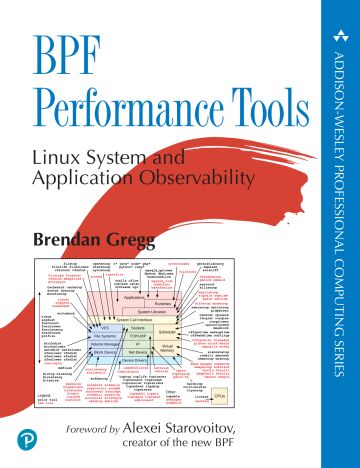"I just want to know how many times this is called."... This is a question I'm often asking for kernel, device, and application events, and there is an efficient way to answer them: using Linux perf stat.
The perf tool (aka perf_events) has different modes of operation. My previous examples on CPU sampling, static tracepoints, and heat maps, used a mode perf_events calls "sampling", where a binary perf.data file is written containing event data. Another mode, "counting", summarizes events in-kernel and passes the summary to user space. This is more efficient, costing less overhead in terms of CPU and storage.
Process Counts
How many processes are being created and destroyed? Using perf stat to count the sched_process tracepoints for 5 seconds:
# perf stat -e 'sched:sched_process_*' -a sleep 5
Performance counter stats for 'system wide':
20 sched:sched_process_free [100.00%]
21 sched:sched_process_exit [100.00%]
37 sched:sched_process_wait [100.00%]
20 sched:sched_process_fork [100.00%]
41 sched:sched_process_exec [100.00%]
0 sched:sched_process_hang
5.001391328 seconds time elapsed
Neat. So there were 20 fork()s and 21 exit()s during 5 seconds. I used -a to match on all CPUs, and sleep 5 as a dummy command to set the counting duration. You can use -p PID instead, to match a process, and skip the sleep command so that perf runs until Ctrl-C.
This works for any event (see perf list) including all static and dynamic tracepoints.
Syscall Counts
Here's syscalls:
# perf stat -e 'syscalls:sys_enter_*' -a sleep 5 | awk '$1'
# started on Wed Jul 2 23:39:50 2014
Performance counter stats for 'system wide':
60 syscalls:sys_enter_socket [99.95%]
68 syscalls:sys_enter_connect [99.95%]
148 syscalls:sys_enter_epoll_wait [99.97%]
8 syscalls:sys_enter_statfs [99.97%]
18 syscalls:sys_enter_dup2 [99.98%]
18 syscalls:sys_enter_getcwd [99.98%]
155 syscalls:sys_enter_select [99.98%]
226 syscalls:sys_enter_poll [99.98%]
[...]
I used awk to strip out syscalls that had zero counts. If that doesn't work for you, add "-o /dev/stdout" to the perf command, which can be needed for older versions (eg, Linux 3.2). Another issue I've had with older versions is the need to increase the file descriptor limit (ulimit -n), when matching this many probes.
This one-liner can be a quick way to determine which syscalls are in use, before moving to using perf record for a closer look, eg, with arguments and stack traces.
Interval Summary
perf stat can also print an interval summary in more recent versions, using -I and a duration in milliseconds. For example, showing the per-second rate of context switches:
# perf stat -I 1000 -e sched:sched_switch -a sleep 5
# time counts unit events
1.000205453 314 sched:sched_switch
2.000456051 290 sched:sched_switch
3.000644420 322 sched:sched_switch
4.000836009 305 sched:sched_switch
5.001022382 198 sched:sched_switch
5.001442140 7 sched:sched_switch
Nice. Again, this works for any event.
By CPU-ID
You can also decompose by CPU id:
# perf stat -A -e sched:sched_switch -a sleep 5
Performance counter stats for 'system wide':
CPU0 495 sched:sched_switch
CPU1 632 sched:sched_switch
5.001377216 seconds time elapsed
Filtering
Finally, --filter can be added to only increment the counter based on a boolean test. For example, counting read() syscalls where the requested size is greater than 4 Kbytes:
# perf stat -e syscalls:sys_enter_read --filter 'count > 4096' -a sleep 5
Performance counter stats for 'system wide':
1 syscalls:sys_enter_read
5.001407932 seconds time elapsed
Notice that I used a "count" variable. Where did that come from, and what else is there?
You can figure out many of the variables by reading the static tracepoint definitions in the kernel source (see the example in my static tracepoints post). Another way is to print their format files:
# cat /sys/kernel/debug/tracing/events/syscalls/sys_enter_read/format
name: sys_enter_read
ID: 509
format:
field:unsigned short common_type; offset:0; size:2; signed:0;
field:unsigned char common_flags; offset:2; size:1; signed:0;
field:unsigned char common_preempt_count; offset:3; size:1; signed:0;
field:int common_pid; offset:4; size:4; signed:1;
field:int nr; offset:8; size:4; signed:1;
field:unsigned int fd; offset:16; size:8; signed:0;
field:char * buf; offset:24; size:8; signed:0;
field:size_t count; offset:32; size:8; signed:0;
print fmt: "fd: 0x%08lx, buf: 0x%08lx, count: 0x%08lx", ((unsigned long)(REC->fd)), ((unsigned long)(REC->buf)), ((unsigned long)(REC->count))
If it's a dynamic tracepoint, you can use perf probe -V to list available variables. I wish there was a similar option for static tracepoints, as well.
So that's a quick tour of basic perf_events counting capabilities. More is possible; see my perf_events page and the perf_events wiki.


Click here for Disqus comments (ad supported).